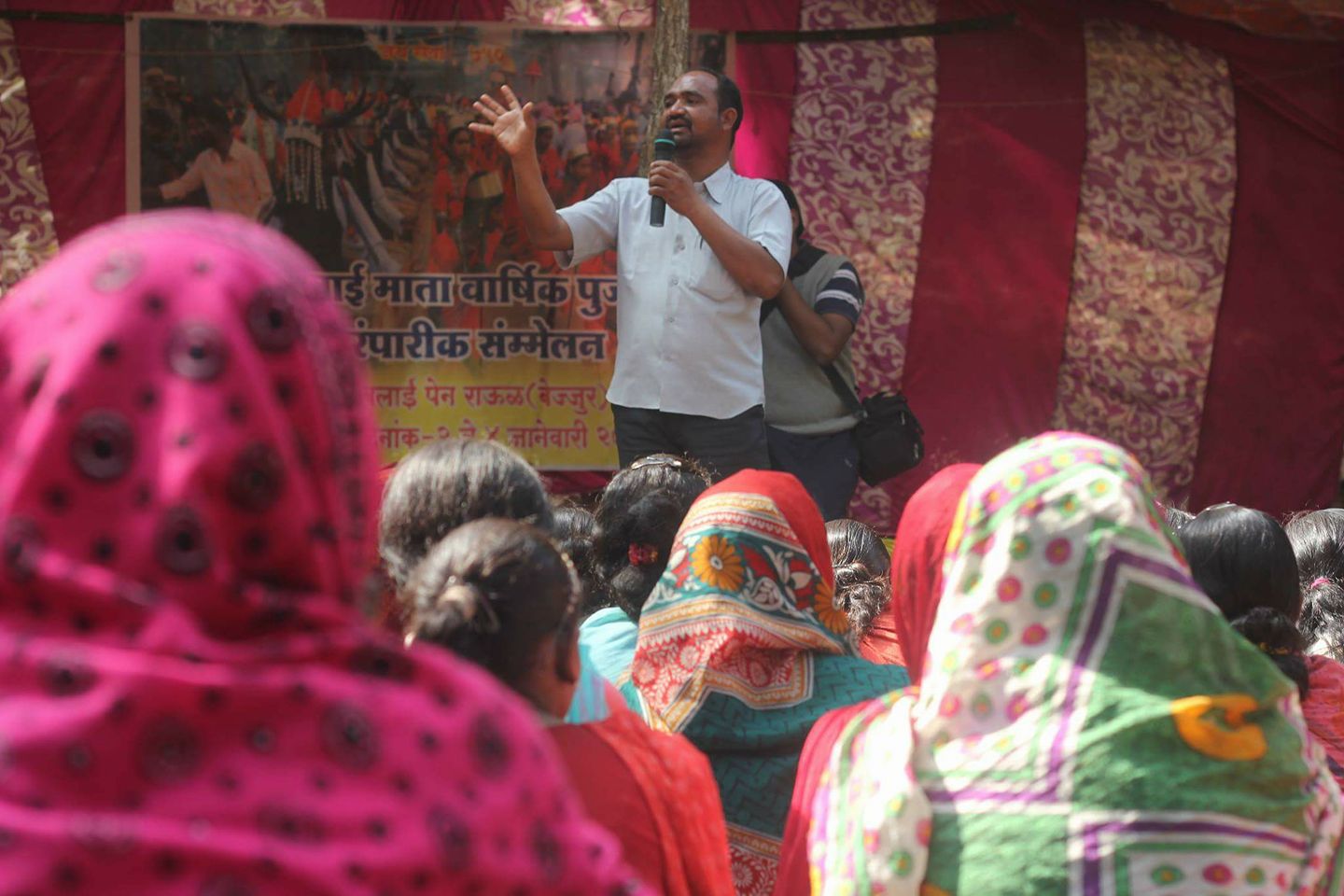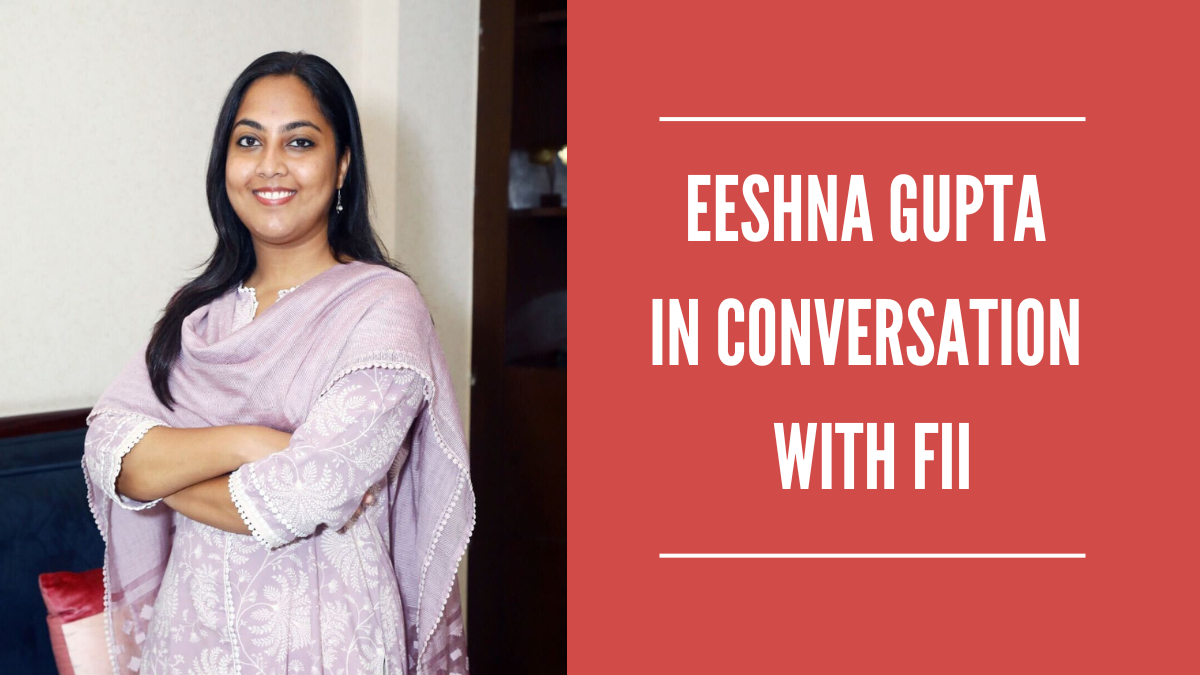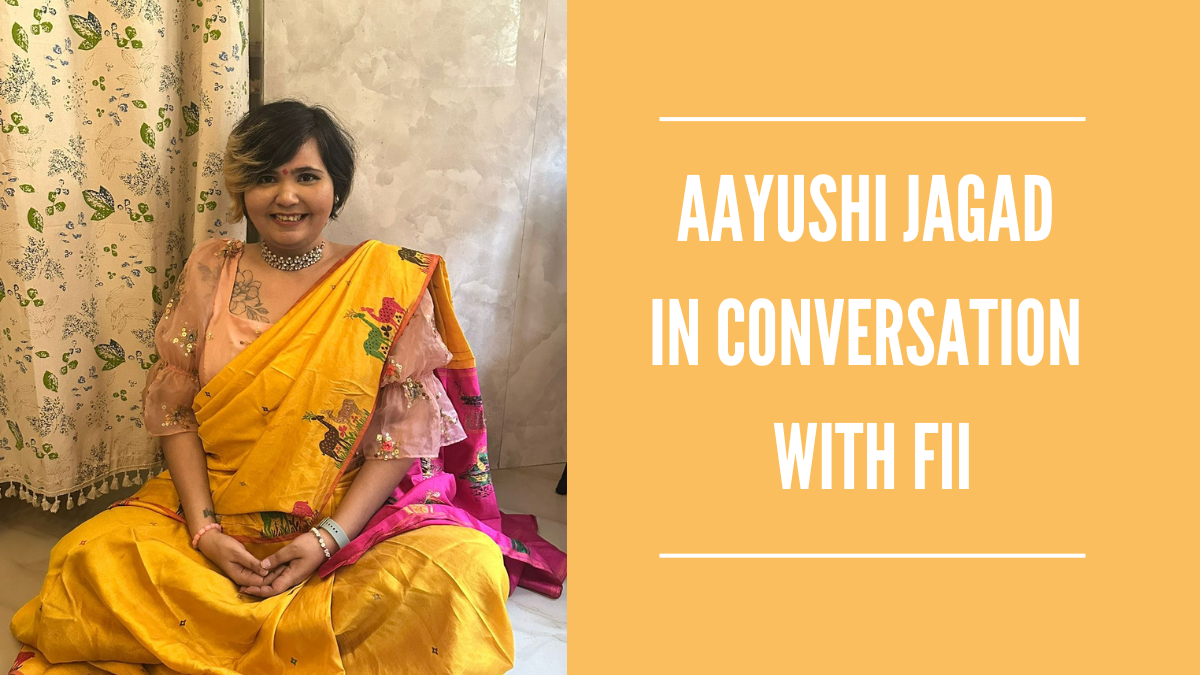Posted by by Rachita Vora and Saahil Kejriwal
Lalsu Nogoti is an independent elected member of the Zila Parishad in the district of Gadchiroli, Maharashtra. He is also the first lawyer from the Madia Gond Adivasi community in that district. A firm voice against large-scale diversion of forest land for numerous mining projects, Lalsu has also been part of several peoples’ movements against the state’s development policies. The focus of his work is on the effective implementation of laws that protect Adivasi rights.
He has been engaged in seeking redress for human rights violations of Adivasis resulting from the crossfire between Maoist insurgent and paramilitary operations in the district. His vision lies in ensuring that the Madia Gonds retain their rights over natural resources of the region. In 2017, he was selected for the Indigenous Fellowship Programme by the United Nations Office of the High Commissioner of Human Rights.
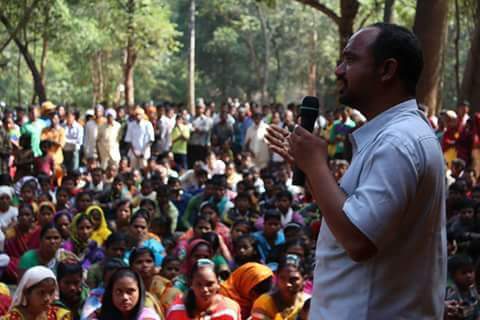
In this interview with IDR, Lalsu highlights the importance of engaging with law and politics to bring about social change, and the important role that local self-governance plays in securing the rights of Adivasi groups.
India Development Review: Could you tell us about your early life?
Lalsu Nogoti: I think the first turning point of my life was when I was three or four, and my father passed away. I come from a remote village, Juvvi, in Gadchiroli which borders Chhattisgarh’s Bastar region. In our tribal community – we are Madia – there is a custom of remarriage, so my mother remarried and returned to her home state, Chattisgarh. The community looked after me. I would help with all kinds of chores, from guarding the farm from birds to grazing the cattle.
Later, the village elders sent me to Lok Biradari Prakalp, at Hemalkasa, so that I could get food and shelter. That was a project by Ramon Magsaysay Award winner, Dr. Prakash Amte. I went to school there. I could not write until I was in grade 5, and I understood very little, but I studied hard. Each year, I stood among the top five in the annual exams. When I topped my grade 10 exams, Prakash bhau offered to send me for higher studies.
The Lok Sabha or Vidhan Sabha are not going to work for the poor. And so we have to enter politics, so we can make laws that are useful for us.
Throughout my childhood, there were people who supported me along the way. I was raised by the community around me, and I was offered help at various points, which I never refused. While pursuing higher studies, I would do any work that came my way – chopping tree branches, sweeping, helping in the School for the Disabled, and working at Yuvagram.
One day, Dr Dhairyasheel Shirole, a trustee of Fergusson College, Pune, was visiting Anandwan. Bharati vahini, one of my guardians, asked him, “Here is a Madia boy who is good at his studies and is honest. Would you take him to Pune to study further?” Bharati vahini also told him that I was an orphan, and had no money.
Fergusson had an ‘earn and learn’ scheme – if I found work, I could earn money and pay for my education. So I decided to go. A few other Adivasi students from Hemalkasa were offered the same opportunity, but weren’t willing to travel so far.
This was a time of many firsts for me: my first time travelling by train; and the first time I was made aware of my Adivasi background. People made fun of me for not speaking Marathi. I never learned Marathi because Madia is my tribe’s language. No one in my village speaks Marathi even today.
But by the time I graduated college, I had a degree with a specialisation in Marathi literature. I then went on to study law.
IDR: What made you choose law as a career?
LN: When I was in college, many Madias were becoming doctors, but not lawyers. I felt that fighting the issues we were facing needed a knowledge of the law, and so I enrolled in ILS law college.
At the time, you would rarely find Adivasi students in these colleges; they were scared to go to such places. My roommate at Fergusson asked me why I wanted to study at ILS. He said, “You will fail. It’s quite hi-fi. You don’t know English.”
I was not afraid to fail. In fact, when I stood first and informed my community, they asked, “Is that a good thing or bad?” They were really not bothered.

Apart from completing law, I also got a master’s in sociology, a bachelor’s degree in journalism, and a master’s in communication and journalism.
In 2006 I returned from Pune to Nagpur, where I practiced law for one year. I had studied law to be able to help my people, but soon realised that the Nagpur Court was inaccessible for them. If I continued working there, I would have earned well but I wouldn’t have served the people for whom I studied law. I wanted to help my people directly, be with them, and discuss their issues face-to-face. And so, I moved to Aheri and worked at the court there.
In the years since, I worked with many organisations on issues relating to tribal rights, including Srujan, Tata Trusts, Ecotech, and Oxfam India.
IDR: In 2016, you entered politics by contesting the local election. What prompted you to do this?
LN: I used to believe politics was a dirty game. But having been closely involved with local governance, I have come to believe that in addition to the law, politics is an important tool for social change. In fact, if we keep shying away from politics, no good person will ever enter this space.
The Forest Rights Act (FRA) has also been crucial because it recognises the rights of scheduled tribes and other traditional forest dwellers over forest land.
The Lok Sabha or Vidhan Sabha are not going to work for the poor. And so we have to enter politics, so we can make laws that are useful for us. For instance, because I helped translate the Forest Rights Act from Marathi to Gondi and Madia, I was able to bring the issues of the Adivasis into those documents.
We were keen to prove how gram sabhas can be brought into the political fold. So, in 2016, we brought up this idea of representing the gram sabha, representing the people. We created rules for it, and the gram sabhas contested elections based on those rules. The most successful initiative was in Bhamragad, where now, the local gram sabhas are in power. There, we won all the seats that we had contested. I was elected as an independent Zila Parishad member in Gadchiroli. One other person got elected to the Zila Parishad, and the others became members of the Panchayat Samiti.
IDR: Can you tell us about your experience with using the gram sabha as a tool for local self-governance?
LN: The gram sabha has emerged as an important local government body, one that can make laws and rules for the village. The seat of government in Mumbai is not the only government. The local government at the village level also has the same powers – for instance, managing the market and what goods can be sold freely, regulating or curtailing money lending activity, and deciding what village-level initiatives are introduced and how their funding is allocated.
Also read: Meet Xavier Dias: The Adivasi Rights Activist And His Journey
The gram sabha’s role in local governance has been strengthened with the passing of two acts: The Forest Rights Act (FRA) and the Provision of Extension to Scheduled Areas Act (PESA). These have been important instruments of social change.
IDR: Could you elaborate?
LN: Let us first talk about the Forest Rights Act (FRA). Before it was passed in 2006, no law had ever mentioned that traditional forest dwellers and scheduled tribes have been subjected to historical injustice. This was the first time that the government acknowledged the injustice, saying that the Act was an effort to correct this.
The Act has also been crucial because it recognises the rights of scheduled tribes and other traditional forest dwellers over forest land. Over the years, these rights have been curtailed as a result of increasing state control over forests, as well as developmental and conservation activities. The FRA, with its provision of individual forest rights (for homestead and agriculture), community rights (for gram sabha rights over forest resources) and community forest resource rights (for gram sabhas to use, manage and protect forest resources), has guaranteed tenurial security over Adivasi peoples’ land and livelihoods.
The FRA also recognises ‘Habitat rights’ of the Particularly Vulnerable Tribal Groups (PVTG), a subcategory of scheduled tribes (ST) that is characterised by low literacy and nutrition levels, and subsistence level of economy. My tribe, Madia, was also declared a PVTG by Union Ministry of Tribal Affairs. This provision is among the most important within the FRA, as it extends beyond the administrative units of the household or the village, and recognises the rights of a larger clan of villages of the same community – in Bhamragad area for instance, there are 108 villages that form a habitat, or ilaka. This traditional structure, with its own traditional leadership, offers livelihood and resources, as well as being socially and spiritually important to the community.
In practice, there are many steps that the people must take to claim these rights (the overall process is controlled at a state level); there are also many Adivasi groups who are eligible to claim these rights but don’t know that they can. This is where the gram sabha’s role becomes even more important, because all initial claims must first be submitted to and verified at the village level.
IDR: And what about the PESA Act?
LN: The PESA Act was passed in 1996. The right to forest produce is the most important part of it. For the first time, the people and the gram sabha can collect the tendu leaves on their own without the interference of middlemen. They can package it, and sell directly to companies. The Act lists many other items as well, including resin, honey, lac, timber, and bamboo. With PESA, more and more people in my area have been able to establish ownership rights over forest produce.
Where I work, the gram sabha is dealing directly with the company. These are new processes, not only in Bhamragad but in many places across the district. And there is much work that activists are doing across the district. The ownership rights over forest produce have resulted in higher incomes, and we are now seeing higher expenditure on education and health.
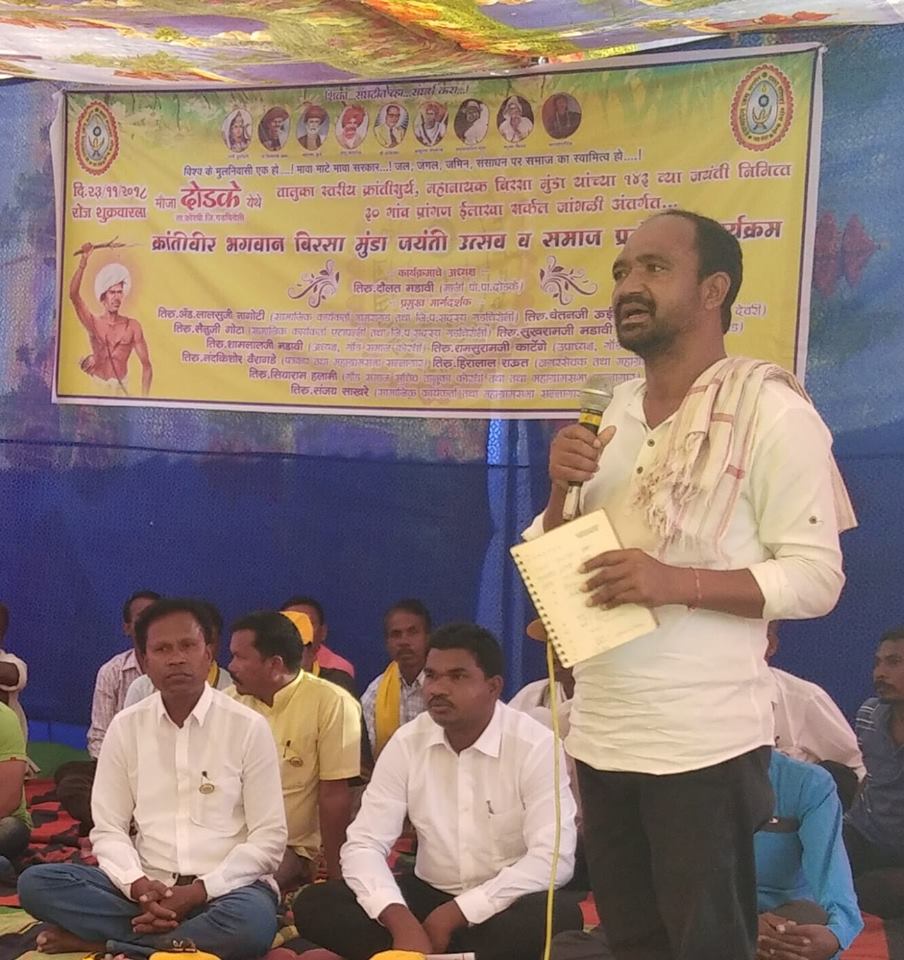
Adivasi culture and the forest are intricately linked. Where there is a forest, the culture remains alive. PESA thus looks after both.
Under PESA, the gram sabha has the authority to handle financial dealings of an area, and control or manage local trade. This helps the people regulate the sale of intoxicants like alcohol or tobacco, and curtail informal moneylending. Further, the PESA Act covers land acquisition and displacement. Now, if anyone wants to buy land for mining, they have to consult the gram sabha and take their consent after a public hearing.
FRA and PESA are very important tools to strengthen the gram sabha and ensure autonomy of the Adivasis. Using these laws, we can increase awareness among people, and give them the confidence to raise their voices.
We have now started a movement to spread legal literacy in Adivasi areas – about FRA, PESA, Biodiversity Act, RTI – and bring about societal change by law. We have also translated the constitution in Marathi.
IDR: What are some of the challenges associated with your work?
LN: Given that we work in a Naxalite area, engaging with the law and politics can be especially challenging. The local police believe that if Naxalites support a law, the government must oppose it. Thus, for them, anybody who supports that law is assumed to be a Naxalite. The police ask people if they agree with, or support, the PESA act. If they do, they are branded as a Naxalite.
Another challenge is that the laws keep changing to suit the ruling government. When the ruler changes, the language changes. For our grassroots activists who believe in this law and support it, the challenge is sustaining that support, especially when someone sitting in the capital can change the law, or cancel it all together.
We also have limited resources, and limited connection with the outside world, especially people located in the corridors of power. Then, what is my strength? Sitting in Bhamragad, I can’t do much. Even still, it is important for me to stay here, and work for my people. My law degree may have given me technical knowledge, but working with the community, I learn new things every day. You can become literate and aware through formal education, but the knowledge of local challenges can only come from working with people.
Also read: 5 Adivasi Women Activists We Should Know About
Apart from challenges in carrying out my work, there are other, more deep-rooted challenges that Adivasis face, chief among them being language. Indian states are divided linguistically – Marathi is spoken in Maharashtra, Gujarati in Gujarat, Bengali in West Bengal. Gondi speaking people have been living in this country from the beginning, but have been scattered across different states, due to which they must learn different state languages. I am in a ‘Marathi cage’. My mother is in Chhattisgarh, where they have to learn Hindi; she’s in a ‘Hindi cage’. In this way, we are left unable to communicate with each other. Our own language has suffered because of this. Plus, we don’t have a formal organisation or structure. Our community is our area of work. There is no office. Our village – Gotul or local space – is our office. So how can we band together, work together on these cultural and political issues for our people?
Translated from Marathi into English by Anupamaa Joshi.
Authors’ note: PVTG is a subcategory of scheduled tribes (ST), characterised by a pre-agricultural level of technology, stagnant or declining population, extremely low literacy rate and subsistence level of economy. There are 75 listed PVTGs in India.
Rachita is Co-founder and Director at IDR. Before this, she led the Dasra Girl Alliance, a Rs. 250 crore multi-stakeholder platform that sought to empower adolescent girls in India. She has a decade of experience, and has spent the past eight years working in the areas of financial inclusion, livelihoods and public health.
Saahil is an associate at IDR. He is responsible for sourcing and editing content, along with online and offline outreach. He has completed the Young India Fellowship, a postgraduate diploma in liberal studies, from Ashoka University.
This article was originally published in India Development Review and has been republished here with permission.
Photo courtesy: Lalsu Nogoti
About the author(s)
India Development Review (IDR) is India's first independent online media and knowledge platform for the development community.
